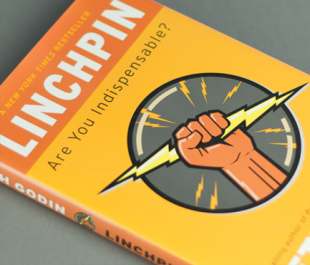This week we finished our summer internship reading of Linchpin by Seth Godin and covered the chapters “Making the Choice,” “The Culture of Connection,” “The Seven Abilities of the Linchpin,” and “When it Doesn’t Work.” We took issue with a lot of what Godin says, but agreed with a good amount as well. Here are some of the concepts we discussed:
Controversy over the 5 Elements of Personality
One thing many of the interns took issue with was Godin’s belief that the five traits of personality–Openness, Conscientiousness, Extraversion, Agreeableness, and Emotional Stability–are all traits of the Linchpin. Of course, this is far from the the personality psychologist’s original intention in creating this model, which was to merely represent personality, not create an ideal.
Intern Joe Becic pointed out that agreeableness is not necessarily a trait necessary for a Linchpin. “If Godin is a linchpin for creating this book, then agreeableness can’t be one of the traits,” he quipped. All jokes aside, it’s not hard to imagine agreeableness ruining a Linchpin. Doesn’t Godin say that we should be breaking the mold, not conforming? For us, a good Linchpin is someone who knows when not to agree, to ask why things are happening, and be an instigator of positive change.
Another trait we took issue with was extraversion. One of our software engineers, Avi Goldberg, says many of the best leaders he has worked with have been introverts. There’s a huge debate right now over whether or not we put too much emphasis on extraversion, with self-proclaimed introverts such as Susan Cain coming out of their bubble and preaching the introvert’s power.
Candyland
Godin believes games like Candyland are detrimental to a child’s development, as these games encourage “agenda following.” By learning to pick cards and follow directions at an early age, Godin believes children are being indoctrinated to work mindlessly and hopelessly. It was interesting to see our different reactions to Godin’s statement and our experiences with similar board games in the past. Most all of us agreed Godin has a point in disliking Candyland, but a few of us (skip this part, Godin) were okay with agenda following and get enjoyment out of consistency and normality. One intern surprised us when she admitted to cheating at Candyland at three years-old. Perhaps that’s what Godin is looking for?
I could be more creative if only…
Godin’s words resonated with us when he described a time corporate coach Deanna Vogt asked him to finish the sentence “I could be more creative if only…” Challenging ourselves to finish a similar statement, “I could do more if only…,” we said we could do more if we weren’t anxious or afraid, had more confidence, or (for one person) didn’t have a TV. Through this exercise we acknowledged the lizard brain acting up and resolved to lessen the things that hold us back.
Looking Back and Real-World Linchpins
For our final session, we decided to share our favorite takeaways from the book and a linchpin we’ve known in our own lives.
Takeaways
Surprisingly, each of us had our own different takeaway. We think the main takeaways for Godin’s book greatly vary depending on who you are and what you’ve done. Here are ours:
- Remember your Lizard Brain– it will try to resist change, to stop you from stepping up. Take on the extra challenge and practice overcoming your lizard brain– then the transition to linchpin will come naturally.
- Don’t put too much emphasis on pleasing people, grades, and feedback. If you’re too intense, loosen up and focus on the things that matter.
- Doing all the little things add up. If someone needs help, take initiative.
- Love your job. If you don’t have one yet, don’t settle for a job where you merely meet the criteria, when you could be doing a job where you are passionate about the work that you do.
Linchpins
Here are some of the linchpins not mentioned in Godin’s book that were important in our lives:
- Professors we have had. Professors who have inspired us to change our major, look at a subject in a new way, or expand our horizons.
- A school district superintendent who has been at the district for over 20 years and who the district is still struggling to replace.
- Past managers and supervisors who have taken the time to walk through a blog post or provide content ideas to help us along.
- Our mothers.
How about you? Who are some Linchpins in your life?






